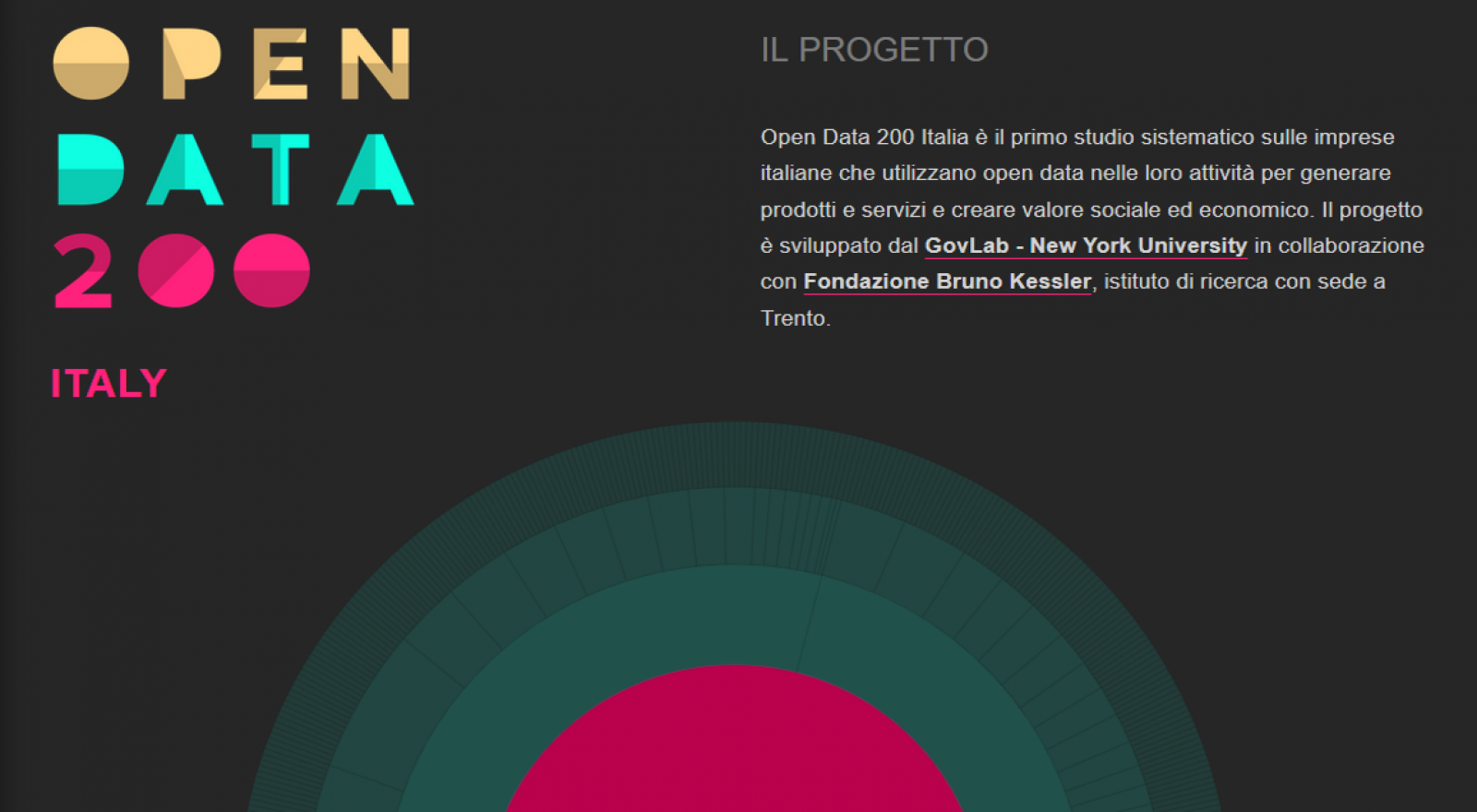Open Data 200 Italia: the first “census” on Italian companies is out
The first findings on Italian companies using open data are out. The project is being conducted by FBK in collaboration with New York University's GovLab
The Open Data 200 Italia project, the first systematic study on Italian businesses using open data to generate products and services is now online.
The census is being developed by Fondazione Bruno Kessler in collaboration with GovLab – New York University which conducted the similar Open Data 500 project in the United States.
“As of today,” Francesca De Chiara, researcher at Fondazione Bruno Kessler, who thanks to the FBK Mobility program worked at the GovLab in New York, explains “you can explore on the new site, available in Italian and English, the first data on the companies involved”. From a first analysis, it turns out that geospatial data are the most used ones, also thanks to the INSPIRE directive that has tidied up the matter. Many companies use alternative data sources, shifting to open and collaborative sources such as Wikipedia and OpenStreetmap. Most of the open data market, or open government data, generates services for the public administration, finding its most appropriate use in the Business to Business sector. This latter aspect highlights the need for many data to be processed, merged, refined and re-distributed to third parties. An interesting example comes from the Ministry of Health, which exposes data used by companies operating in the tourism industry, as the most requested dataset is georeferenced pharmacies. The collaboration with Data Space for the use of the Atoka database and the interest expressed by data.gov and the Chamber of Commerce of Padua, with which we have produced dissemination webminars of dissemination and project presentation sessions, has been precious. ”
“When it comes to open data,” says Maurizio Napolitano, head of the Digital Commons Lab at FBK, “we are referring to the many growth expectations that they are able to offer to the community. The most recurring topics are those of transparency and the economy. There are many estimates of what the scenario would be if open data were a tangible reality that could provide up-to-date and well-structured data. Unfortunately, there is still a long way to go. But there are people who still believe in this. Among the major players there are companies that use data. They are mostly companies working in the ICT sector. These, together with activist organizations and researchers, show how the release of data by governments, semipublic bodies, businesses and communities can really result in economic and social impact. Therefore, the call is to look (in a critical way as well) at the results of this study and to continue to report in order to improve and make this action more and more effective.
Background
The term “open data” means free access to data for any purpose and reuse. The data consists of descriptions of non-ambiguous facts, archiveable in digital format (e.g. temperature, population, number of vehicles present on the highway, quantity of goods sold, and so on). The evolution of new technology has made it easier to collect and archive data digitally. There are several players who collect data: public administrators, businesses, and communities. Each of these, having the right to their databases, may decide to make them available for third parties to use it for any purpose.
Government agencies are considered to be the main player able to open data as they deal with public property. In international policies, open data are seen as one of the starting points for activating processes of transparency, collaboration and participation (all is summed up with the word “open government”, and Open Government Partnership is an international initiative that promotes sharing these principles; 65 nations that have joined it).
Open data is also seen as an important tool to promote economic growth. There are several reference studies that forsee, when opening data, scenarios that can generate social and economic value.
Open Data 500
Open Data 500 is a project promoted and conducted by GovLab at New York University, where the re-use scenarios of public sector data of 500 U.S. based companies are pointed out.
The US Open Data Catalog has an Impact Section (http://data.gov/impact) where a directory of companies using open government data can be found.
Open data 200 italia
Thanks to the Mobility project promoted by Fondazione Bruno Kessler, Francesca De Chiara, with the Digital Commons Lab, was a resident fellow at Govlab-NYU and has been developing the same research on an Italian scale, starting with a first selection of 200 companies. The Open Data 200 Italia platform is available in Italian and in English.
After a period of comparative pre-analysis of U.S. and Italy in data-opening policies, the first data of the study are now available that will provide a clearer and more up-to-date picture of the open state health status in Italy, and important suggestions for better implementation of national data-opening policies.
Data emerged
Visiting the Open Data 200 Italia website you can take a look at a significant sample of 55 Italian companies (further releases are expected in the future and companies are invited to apply here by filling out the survey to participate in the study).
Data shows that the main segment where these companies operate is, for 47% of the sample, in B2B (business to business, i.e. the market among companies) with integration, analysis and re-processing of useful data to third parties (e.g. support tools for insurance or banks).
Further speaking of market segments, only 17% develop solutions for end-users (B2C). The problem here also applies to the availability of data and the need to affect already saturated markets.
The remaining 36% is occupied by companies working in public administration services. We are talking, for the most part, about creating open-data deployment platforms or extensions implementations to extract and convert data according to open-data paradigms (literally “open data”).

